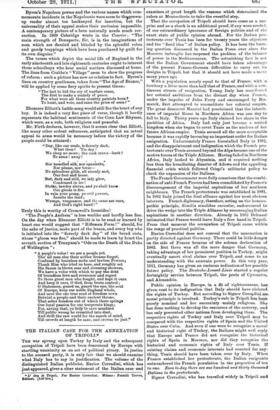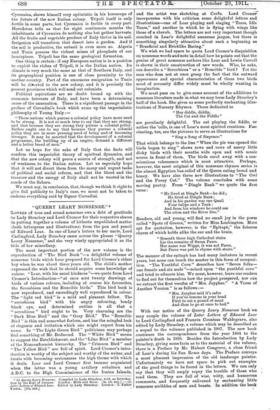THE ITALIAN CASE FOR THE ANNEXATION OF TRIPOLI.* THE war
sprung upon Turkey by Italy and the subsequent occupation of Tripoli have been denounced by Europe with startling unanimity as an act of political piracy. In justice to the accused party, it is only fair that we should examine what Italy has to say in justification. The volume of the distinguished Italian publicist, Enrico Corradini, which has
just appeared, gives a clear statement of the Italian case and .L' Oro Si Tripoli, Per Enrico Corradini. Pintelli Trevest Editori. [8.501fre..1
examines at great length 'the reasons which determined the rulers at Montecitorio to take the eventful step.
That the occupation of Tripoli should have come as a sur-
prise and as a shock is an additional proof, if were needed, of our extraordinary ignorance of foreign politics and of the exact state of public opinion abroad. For the Italian pro- tectorate over Tunis has been for twenty years the objective- and the "fixed idea" of Italian policy. It has been the burn- ing question discussed in the Italian Press ever since the Morocco imbroglio has reopened the problem of the balance of power in the Mediterranean. The astonishing fact is not that the Italian Government should have taken advantage of the present Franco-German difficulties to carry out ite designs in Tripoli, but that it"should not have made a move many years ago.
With a population nearly equal to that of France, with i territory a little more than half that of France, and with a con- tinuous stream of emigration, 'Young Italy has manifested her colonial ambitions from the distant day when France,. under the impulse of Jules Ferry and encouraged by Bis- marck, first attempted to reconstitute her colonial empire.. The great democrat Mazzini bad proclaimed that the inherit- ance of imperial Rome in Northern Africa was one day to fall to Italy. Thirty years ago Italy claimed her share in the partition of Africa. Italy had only just become a united kingdom when she began to covet Tunis as the nucleus of her future African empire. Tunis seemed all the more.acceptable because it was rapidly becoming an important outlet for Italian emigration. Unfortunately France forestalled Italy in 1881, and the disappointment and indignation which the French pro- tectorate over Tunis aroused beyond theAlps became one of the motive forces of the Triple Alliance. Havinefailed in Northern, Africa, Italy looked to Abyssinia, and it required nothing less than •the humiliating disaster of A:dowa and the appalling financial crisis which followed Crispi's militarist policy to- check the expansion of the Italians.
The French Government were fully conscious that the combi- nation of anti-French Powers hadbeen consolidated by France's• discouragement of the imperial aspirations of her southern- neighbours. The French protectorate was established in 1881. In 1882 Italy joined the dual alliance against her most obvious- interests. French diplomacy, therefore, acting on the homceo- patliic principle, Similia aimilibus eurantur, endeavoured to drive the wedge into the Triple Alliance lay encouraging Italian aspirations in another direction. Already in 1902 Delcass6- intimated that France would leave Italy a free hand in Tripoli. From that moment the oceepation .of Tripoli came within, the range of practical polities.
Enrico Corradini does not conceal that the annexation ie. partly directed against Germany. There could-be little danger on the side of France because of the solemn declaration. of 1902. But there was all the more danger that Germany, taking advantage of her prominent position in Turkey,, might eventually assert rival claims over Tripoli, .and come to an understanding with the suzerain power. In this very year,. 1911, Germany has given an ominous indication of her possible future policy. The Deutsche-Levant-Linie started a regular-, fortnightly service between Tripoli, the ports of Cyrenaica, and Alexandria.
Public opinion in Europe, in a It of righteousness, heik given vent to its indignation that Italy should have violated. the rights of Turkey. But according to Signor CorrlicliniAtr, moral principle is involved. Turkey's rule in Tripolihag hews purely nominal and her suzerainty mainly religions. She has done nothing to develop the resources of the country, and has only prevented other nations from developing them. The respective rights of Turkey and Italy over Tripoli may be compared with the respective rights of Spain and the United States over Cuba. And even if one were to recognize a moral and historical right of Turkey, the Italians might well reply that Europe and France did not recognize the historical rights of Spain in Morocco, nor did they recognize the- historical and economic rights of Italy over Tunis. If existing claims and economic interests had counted for any- thing, Tunis should have been taken over by Italy. When France established her protectorate, the Italian emigrants. outnumbered the French povulation in the proportion of ten to one. Even to-day there are one hundred and thirty thousand Italians in the protectorate.
Signor Corradini, who has travelled widely in Tripoli and
'Cyrenaica, shows himself very optimistic in his horoscope of the future of the new Italian colony. Tripoli itself is only fertile in some parts, but Cyrenaica is fertile in every part. Herodotus tells us that for eight continuous months the -inhabitants of Cyrenaica do nothing else but gather harvests. All the fruits and vegetable produce of Italy thrive in its soil.
Irrigation will transform that desert into a garden. And if
',the soil is productive, the subsoil is even more so. Algeria -and Tunis possess the richest mines of phosphate of our themisphere. Tripoli has the same geological formation.
One thing is certain : if any European nation is in a position to exploit the riches of Tripoli, it is the Italian nation. Its climate is very much the same as that of Southern Italy, and its geographical position is one of close proximity to the 'mother country. Part of the enormous emigration to Tunis will be diverted to the new colony, and it is precisely the poorest provinces which will send out colonists.
Political aspirations are no doubt bound up with the
economic interests of Italy, and have been a determining =use of the annexation. There is a significant passage in the ;preface of Corradini's book which sums up the imperialistic ;philosophy of Young Italy:— "Those nations which pursue a colonial policy have more need :to be strong. It is not so much true to say that they are strong, .and that because they are strong they pursue a colonial policy. Rather ought one to say that because they pursue a colonial policy they are in more pressing need of being and of becoming -stronger. It may be asserted that the development of a colonial programme, the building up of an empire, demand a different and a better breed of men."
Let us hope for the sake of Italy that the facts will confirm this imperialist theory of spiritual dynamics, and that the new colony will prove a source of strength, and not of weakness, to the Italian nation. Let us especially hope that it will not divert them from the many and urgent tasks -of political and social reform, and that the blood and the treasure and the energy of Italy shall not be wasted in the -sands of the Sahara.
We must say, in conclusion, that, though we think it right to give full publicity to Italy's case, we must not be taken to 'endorse everything said by Signor Corradini.











































 Previous page
Previous page